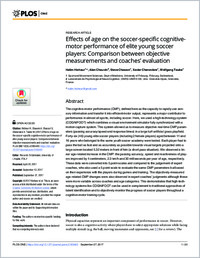Effects of age on the soccer-specific cognitive-motor performance of elite young soccer players: Comparison between objective measurements and coaches’ evaluation
- Hicheur, Halim Sport and Movement Sciences, Dept of Medicine, University of Fribourg, Switzerland
- Chauvin, Alan Laboratoire de Psychologie et NeuroCognition, CNRS±UMR 5105, Univ. Grenoble Alpes, Grenoble, France
- Chassot, Steve Sport and Movement Sciences, Dept of Medicine, University of Fribourg, Switzerland
- Chenevière, Xavier Sport and Movement Sciences, Dept of Medicine, University of Fribourg, Switzerland
- Taube, Wolfgang Sport and Movement Sciences, Dept of Medicine, University of Fribourg, Switzerland
-
27.09.2017
Published in:
- PLOS ONE. - 2017, vol. 12, no. 9, p. e0185460
English
The cognitive-motor performance (CMP), defined here as the capacity to rapidly use sensory information and transfer it into efficient motor output, represents a major contributor to performance in almost all sports, including soccer. Here, we used a high-technology system (COGNIFOOT) which combines a visual environment simulator fully synchronized with a motion capture system. This system allowed us to measure objective real-time CMP parameters (passing accuracy/speed and response times) in a large turf-artificial grass playfield. Forty-six (46) young elite soccer players (including 2 female players) aged between 11 and 16 years who belonged to the same youth soccer academy were tested. Each player had to pass the ball as fast and as accurately as possible towards visual targets projected onto a large screen located 5.32 meters in front of him (a short pass situation). We observed a linear age-related increase in the CMP: the passing accuracy, speed and reactiveness of players improved by 4 centimeters, 2.3 km/h and 30 milliseconds per year of age, respectively. These data were converted into 5 point-scales and compared to the judgement of expert coaches, who also used a 5 point-scale to evaluate the same CMP parameters but based on their experience with the players during games and training. The objectively-measured age-related CMP changes were also observed in expert coaches’ judgments although these were more variable across coaches and age categories. This demonstrates that high-technology systems like COGNIFOOT can be used in complement to traditional approaches of talent identification and to objectively monitor the progress of soccer players throughout a cognitive-motor training cycle.
- Faculty
- Faculté des sciences et de médecine
- Department
- Département de Médecine
- Language
-
- English
- Classification
- Sports sciences
- License
-
License undefined
- Identifiers
-
- RERO DOC 305759
- DOI 10.1371/journal.pone.0185460
- Persistent URL
- https://folia.unifr.ch/unifr/documents/305952
Statistics
Document views: 143
File downloads:
- pdf: 145
